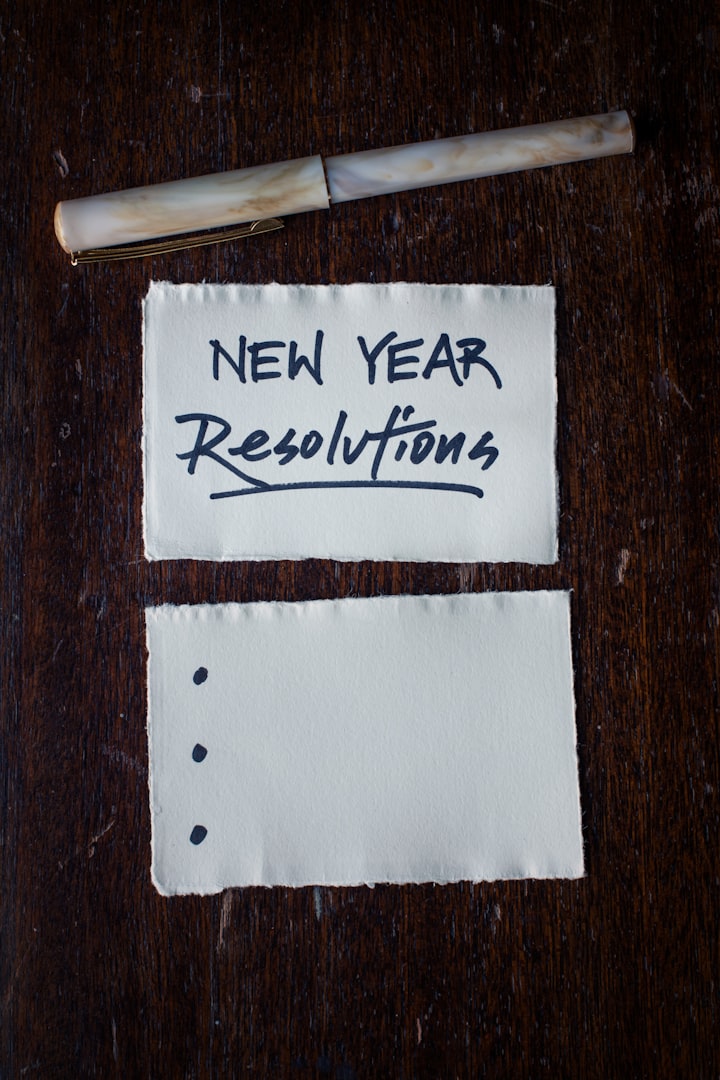How to Set New Year's Resolutions that Actually Work
Reflect upon 2020 and Prepare for 2021 - If you've not done it already

Every year, we stand in front of a challenge - to make the best out of every day that we've been given, again. To live as we wish to, to do what we want to, as much as we can, as well as we can, to be as aligned to who we truly are as possible and not to have regrets over who we are - who become, what we do, what we choose to invest our energy in and how we live.
It's not an easy task, to say the least. However, if we want to feel good about the year's ending and the new year coming, there are quite a few things we can do to make every coming year better.
It's always about being able to see and appreciate what we've learned over the past twelve months, as well as that what we missed to learn and so what we're left to do - better, fix, improve and perfect, in the coming time.
And that's where the annual old year's reflection and new year's planning comes into place. Without these two, it's hard to keep a track of our progress or a lack of it, and therefore, keep moving ahead in a direction we want.
Reflecting upon the year leaving
As I've already said, being able to reflect upon how we spent the last twelve months of the year coming to an end, is crucial for our personal development.
Have we made any personal/ professional progress we are happy with? Have we reached the goals we had set up for ourselves? Have we made any of those dreams often playing on our minds come closer to reality? Have we moved towards the direction we want our life to go? Or have we not?
This is an example of what can and should be reflected upon as we look back on 2020 as a whole and compare it against our journey up until where we are now. There are many ways to do this obviously, I am going to share with you precisely what I do as my annual year-end reflection.
Goals for 2020
First, I look at the goals I set up for this year. I separate them into two groups - personal and professional goals. Then, I explore each group thoroughly and acknowledge which goals out of the list I was able to fulfil.
I go from one goal to another, reflecting upon how much have I done to make the goal I had materialize. Have I done something for it to happen? Have I taken time and put efforts into working towards it? Or have I not? If I wasn't able to succeed with it yet, or at all, I look closely at the 'Why'.
Why was it that I failed to make it happen? Was it due to something I've not done, or some external complication that hindered my progress or stopped me somehow? As I reflect back, I make notes of all the things I managed to do, and the things I failed to do as intended. As well as of the things I am aware of now that need improvement in order for me to do better next year.
An example of my 2020 goal that I wasn't able to achieve yet, was becoming an early morning get-upper. And due to me failing in this, I lost with some other goals too. I realized I failed to achieve this goal because I haven't tried enough for long enough to change my routine and sleep patterns. Despite me truly wanting to change and achieve this goal, I wasn't focused and determined enough over a long enough period of time to cultivate the change.
I was flaky with following the rules I set for myself, I wasn't disciplined enough and strong-willed. Therefore, if I don't want to repeat the same mistake this year, I need to stick to the rules that seem difficult at the beginning, I need to stay focused, persevere and avoid laziness, the urge to keep postponing this for yet another week constantly as that let to me not achieving it at all this year.
However, I also managed to achieve a few of my goals, such as to overcome my 15 years of a writing block and start writing regularly. Or to progress with a few of online trainings or qualifications I was looking to get, in coaching, arts - drawing and painting, and interior design. I succeeded thanks to certain qualities and approach.
Through reflecting on my annual goals, I realized where I failed, what kept me away from achieving and what doesn't help me to grow. As well as where I've succeeded, what helped me to succeed and what I should keep doing so that I keep growing.
Once I went through all goals, I have a solid picture of how my year looked like in terms of goal achievement. As well as what the goals I am still to work towards are, and what I can improve this time to make succeeding easier - based on my lessons learned.
Themes of 2020
We can have our goals and plans, but life often has other plans for us.
That's why it's good to thoroughly explore what main themes played out in our lives in the past year.
Perhaps, you had big plans to set up a retail business or to start organizing art workshops or medical conferences, and then the global pandemic happened. Or you had plans to travel the world and the goal to have visited 30 countries by the end of the year, but you got sick and there was no travels. There can be other unexpected occurrences such as illness in the family, unexpected move, loss of a job or a partner due to break-up or separation.
So the question is, what themes played out in your life this year? What have you experienced due to the themes played out? And how did it shape the course your year took?
The main themes I recognise to make this process easier for yourself are:
1. Career
2. Health
3. Home - physical environment
4. Family and friends
5. Partner and relationships
6. Money
7. Personal development
8. Leisure - fun time and new experiences.
You can obviously identify more than these eight, and they can come in whichever order. Some of them may be more significant than others and that's only natural. What's important is to look at which of them played the main role this year and in which sense. As well as - what have you learned from it all?
For me, I wanted to mainly focus on my career and personal development this year, however, due to life being life, my home - change of residence as well as relationship, or money, has become a big topic too. Because there was more to focus on, there was more to deal with and invest my energy into. And that had an impact on what I've initially planned. Nevertheless, I learned a lot thanks to encountering these unexpected shifts.
For instance, when it comes to love and partnership, I had issues with letting go and welcoming change in the last couple of years. It's not been easy for me to deal with and accept having to let go of something that I wasn't prepared to 'lose'.
This year, I learned that change is beneficial and that letting go is necessary. Both are an inevitable part of life and it's only natural to allow them to happen - that what doesn't work needs to leave and accepting that makes it easier for new things that are better to come our way.
Only by letting go, that what's dysfunctional can be replaced by better things that are in alignment with who we are. I learned to see the change as something I gain from, not loose by. The fact is, new is always better than the old that doesn't work.
What themes resonate with you? What did they mean? How have you coped? What have you learned (about yourself) by going through them?
2020 Summary
Before wrapping up the year completely, and based on the previous two exercises, I compose what I call the summary of the year.
This involves:
1. The year's accomplishments
2. Learnings from the year
3. The best of the year
4. Motto of the year
5. The word/ rating for the year
The year's accomplishments as well as the learnings are very much a product of the past two reflection exercises. In this part, I put them all together and reserve one full page of my diary to 1. the accomplishments, 2. the learnings as things I am grateful for.
The best of the year is a summary of the best moments, times and memories that I can recall. Such as time with friends and family, situations within business or job that seem vivid and great to think back on. It can be all the moments that made you laugh, the ones that seemed eternal and you didn't want them to stop, the ones that made you love life and the ones you never want to forget about.
Motto of the year is a sentence or two, something that describes the year ending, it can be the biggest learning or a thought that comes to mind whenever you think back of this year.
There's always hope and blessings, even in the most difficult circumstances. And there's always a solution. Nothing can break me unless I give my power away.
The word for the year is a single word (or you can use a few words) to describe the year passing by. My word for 2020 is transformation. And rating for the year is anywhere on the scale from 1 to 10; it's based on your experience whether the year felt like 10 - brilliant, or 1 - tough and unsatisfactory.
Thanks to this, whenever look back on the year passed, trying to revisit and remember it, I see it clearly - what it was about, what I went through, what it meant and how it felt.
Setting goals for 2021
Once the past year has been reflected upon and closed out, it's time to look ahead to the future, envision the new year and make plans and goals for the coming time.
The three main elements of my new year's preparation are my:
1. Annual goals
2. Plans for the year ahead
3. What to avoid - based on what I've learned last year
Annual goal setting is an essential aspect of planning the year to come. I have a new page ready in my diary where I put '2021 Goals' at the top and think of everything 'big' that I wish to achieve in the coming year.
It's good to note that you can make this list over a few days, not just a few hours within one day. I've learned that it takes longer to think strategically over such a significant time period as a whole year of time, as well as to structure your goals practically and realistically to make them truly achievable. You can add another goal or a few in the first few months of the year as you're still in the process of paving your way there.
Some of the goals I've identified look like this:
1. Make writing a regular source of my income - together with how much I wish to earn from it monthly.
2. Find a property to buy - where, how big I wish it to be, and much I am intending to invest in it.
Once I have a list of all I could think of, I move onto plans.
'Plans for 2021' involve all activities that are not quite my goals, but rather milestones on the way I know of already, that I'd like to or need to focus on in the coming months of the new year.
Two such examples are:
1. Settle a new contract for HR Advisory and Recruitment in Jan
2. Move out of the Kew property into a new accommodation in Jan
These help me to stay focused on my milestones and tasks, to prepare for the responsibilities and keep a track of when these should be delivered.
'What to avoid' is a list of things that didn't serve me in the past year - the things that hampered my progress, kept me from achieving, didn't seem to help me in succeeding. This is all about an ability to recognize and name them which serves me as an awareness. Writing them down, linked to the coming year is a vivid reminder of what not to bring to the new year with me.
Some of those things relevant for me are:
1. Procrastination - avoiding and postponing plans or building new habits
2. Comfort zone - keeping it safe at the price of not making any move
3. Inconsistency - starting but not persevering in executing new things
And then, the last of my 2021 preparation is:
4. Bettering my day/ week structure
This is meant to be an improvement or a perfection of my existing day routine and practice to plan my days. As you can see, as a person who prefers order and transparency over my schedule, I like to be this organized.
I appreciate that not everyone is the same way and so not all of you would like or need to do this. Still, in my daily and weekly structure, I create time slots for certain activities, making sure there's a regular time portion for work - personal and business-related, study and leisure time.
Here's an example of my improved day structure (based on last year's learnings):
Wake-up & Breakfast time : 8–9,30 am, and a list of activities to follow
Productive time : 10 to 12 am, urgent, important, heavy business work
Break : 12 to 1 pm, lunchtime, relax, walk or reading
Active time: 1 to 4,30 pm, operational, creative, non-urgent tasks
Passive time : 5 to 6 pm, email responses, closing up
Education time: evening time, creative, educational courses
Rest time : reading, cooking, exercise, etc.
- - -
I complete my planning for the year ahead by this activity.
I hope you'd find this guide helpful on your journey of closing upon the 2020 and preparing yourself for the year 2021.
Wish you all the best for the New Year!
About the Creator
Lucy Milanova
✎ Self-Development, Mental Health, Mindfulness, Inspiration Writer | Londoner | Creative Entrepreneur | HR Consultant | Transformation Coach💡 www.lmcreativesolutions.com






Comments
There are no comments for this story
Be the first to respond and start the conversation.